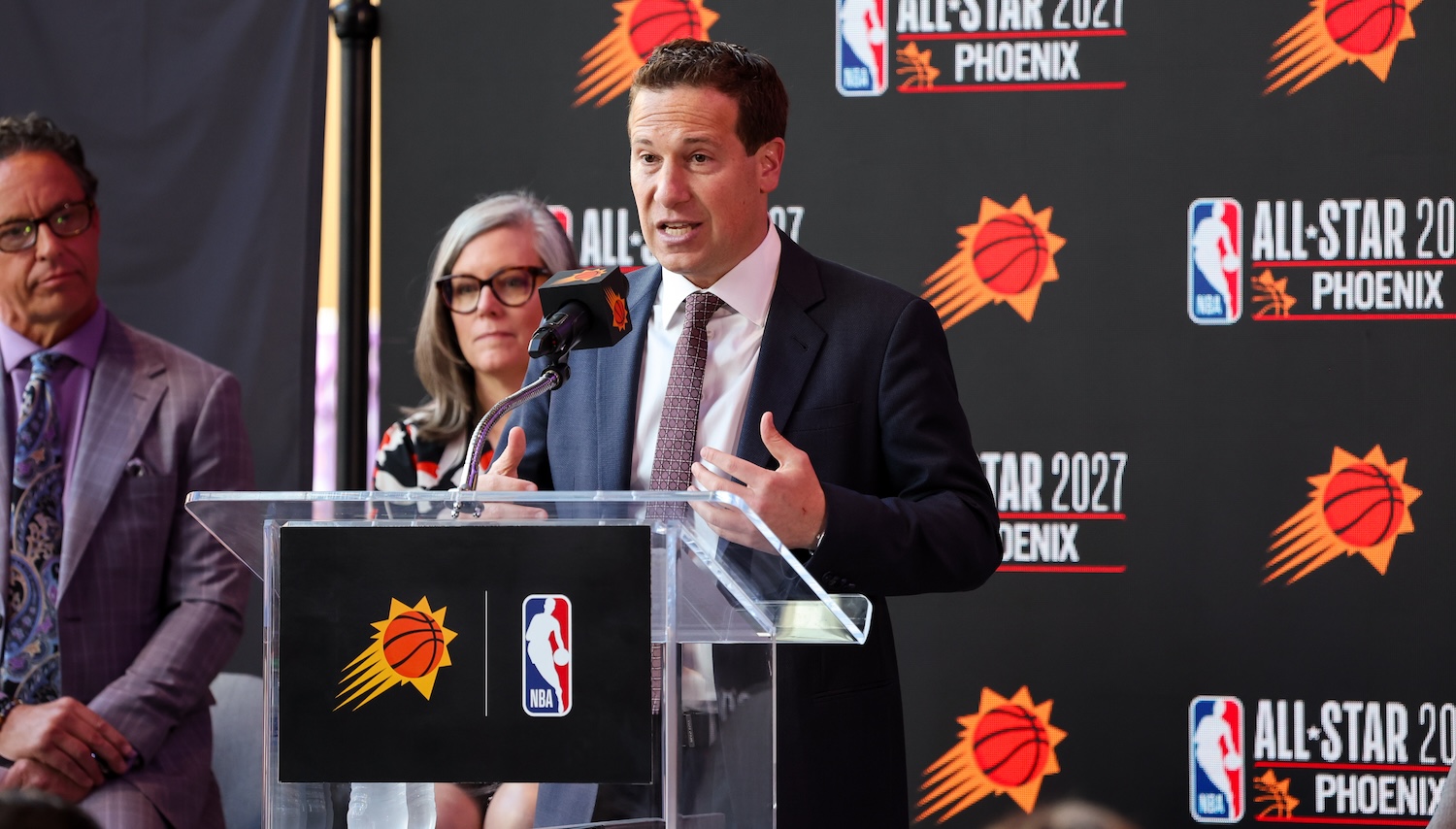Mat Ishbia is the subject of a pair of separate reports published on Tuesday, concerning the Phoenix Suns owner's company United Wholesale Mortgage and its aggressive, allegedly unlawful tactics that helped it become the largest mortgage lending company in the United States. Together they paint a picture of a ruthlessly competitive businessman who made enough money to buy his way into the NBA by trampling on smaller companies and lobbing bombs at larger ones, in a vicious quest to gain as much market share as possible. Along the way, some people got hurt. In other words, the revelation is that Ishbia is a successful capitalist.
Both stories center on the way Ishbia's company pressured brokerages to steer business toward UWM and away from their competitors. ESPN's Baxter Holmes, who was all over the ousting of former Suns owner Robert Sarver, focused primarily on Ishbia's long-running conflict with Cleveland Cavaliers owner Dan Gilbert, whose company Rocket Mortgage is UWM's primary competitor and is now, perhaps due to those aforementioned tactics, the country's second-largest mortgage lending firm.
"He doesn't like me," Ishbia said of Gilbert in May 2023, "and I don't like him." There are some intriguing details about Ishbia threatening brokers who wouldn't sign loyalty pledges with $5,000 fines, a Rocket executive calling Ishbia "the playground bully, taking the smaller kids' lunch money," and UWM hanging a faux national championship banner in company HQ after passing Rocket to become the largest wholesale lender in the U.S. Holmes noted that Ishbia was approved as the Suns owner by a 29-0 vote with Gilbert abstaining, although that seems to be the extent of his public-facing hostility toward Ishbia.
The other story was published by a strange new outlet called Hunterbrook. This report, with a five-person byline, is significantly longer and gets further into the weeds, leading off with a voicemail of Ishbia bragging, "We fucking took those cocksuckers down, fuck them, and we’re gonna keep fucking sticking it to them forever." Hunterbrook's story is also rich with details and replete with data: The reporters talked to North Carolina homebuyers who were roped into above-market mortgages because they went through a big broker who funneled 99 percent of her $554 million's worth of business through UWM.
“We fucking took those cocksuckers down, fuck them, and we’re gonna keep fucking sticking it to them forever.” — Mat Ishbia, CEO of @UWMlending, owner of the @Suns pic.twitter.com/oRFEA7VSRn
— Hunterbrook (@hntrbrkmedia) April 2, 2024
"Hunterbrook found $39 billion in mortgages came from brokers who sent UWM more than 99 percent of their business," reads the article. "In all, borrowers paid UWM between hundreds of millions and billions more in closing costs than people whose brokers found them typical loans." As Ishbia pushed UWM to force brokers into exclusive deals, his company's share of the independent mortgage broker market rose from 31 to 48 percent. UWM has reportedly been less aggressive in forcing brokers into exclusive arrangements since 2023, though it chased out several competitors while consolidating its hold of the market. Inching closer to monopolistic control, UWM squeezed:
"Within this group, Hunterbook estimates that borrowers paid UWM $229 million more in closing costs over the past four years than those whose brokers provided them with an average priced loan. Assuming the loans evaluated by Hunterbrook Media are representative of the overall national population, as examined in the methodology, this indicates Americans have paid UWM an estimated $894 million more in total."
Hunterbrook
Experts who spoke with Hunterbrook said UWM may have violated parts of the Truth in Lending Act, which—you guessed it—governs truth in lending. It's bad news for Ishbia, but a nice scoop for Hunterbrook. Hunterbrook Media is the journalistic arm of Hunterbrook Capital, a $100 million hedge fund started in November 2023 by investor Nathaniel Brooks Horwitz and writer Sam Koppelman (Brian Koppelman's son). The model is somewhat similar to Hindenburg Research: An investigative staff dredges up and publishes damning information about publicly traded companies, while the hedge-fund arm takes out sizable short positions that the journalistic arm will hopefully boost. Upon publication of their UWM report, Hunterbrook said it also sent its findings to regulators and a law firm specializing in class-action suits, and filed a whistleblower report with the SEC.
It's very easy to break securities laws while trading on informations scoured up by journalists, and while Hunterbrook says its newsroom and trading desk will be separated by a compliance team, everyone involved has a financial incentive to work in harmony. When reporters dig up material non-public information, Hunterbrook says it will publish stories before taking up any trading positions. which is good journalism and bad business, but the company is first and foremost a hedge fund. Reporters' compensation is also tied to some degree to the performance of the fund.
Still, the numbers in the investigation of Ishbia and UWM paint a picture of a man who made his billions by squeezing regular homebuyers through questionably legal anti-competitive maneuvers. Although it's not materially different from what Ishbia's archrival did to build his own business, it's always good to be reminded that there is no such thing as a benevolent sports team owner. Robert Sarver, a menace, deserved to be hounded out of the NBA. Then a different kind of menace took his place.





